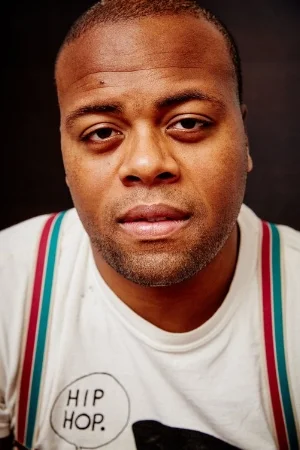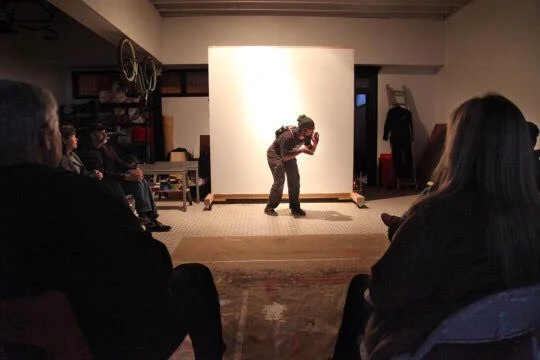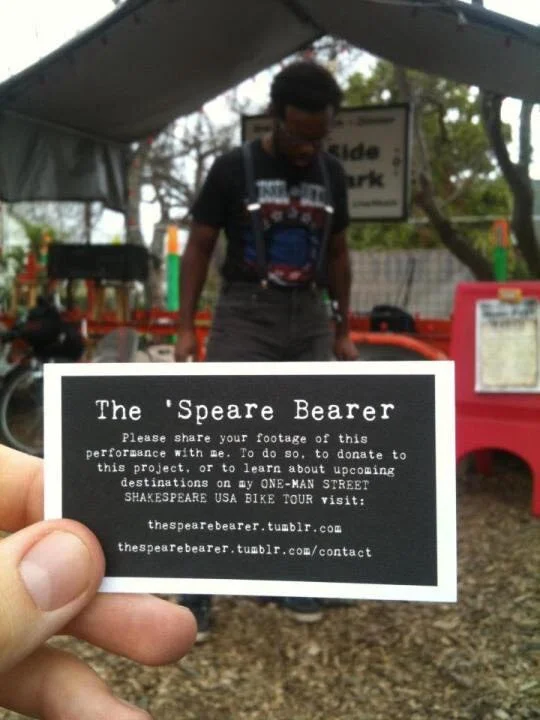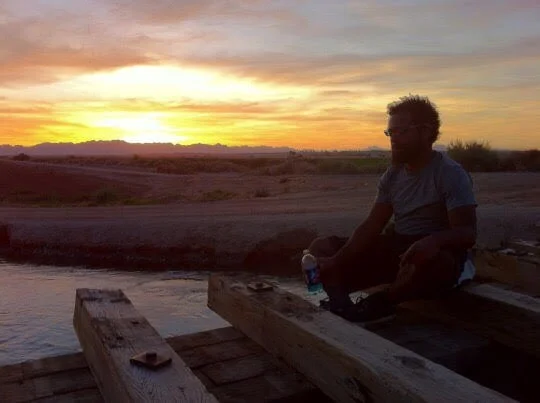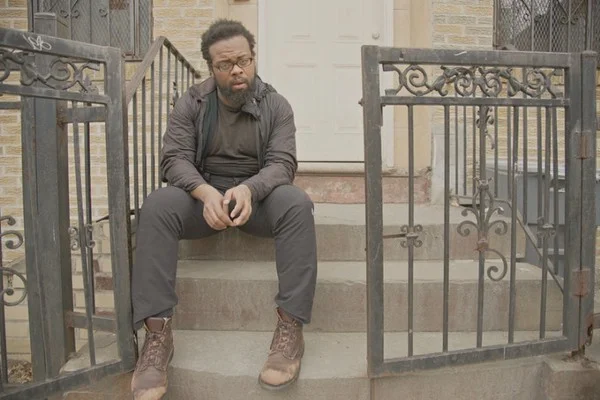Ralf Jean-Pierre aka Precious Gorgeous
In 2012, after the sudden death of his best friend, actor and musician Ralf Jean-Pierre aka Precious Gorgeous was determined to conquer his fears by doing the thing that scared him most. Alone on his Surly Long Haul Trucker bicycle, Ralf circled America, riding over 4000 miles in eight months while performing his favorite Shakespeare scenes for unsuspecting audiences.
The guerrilla performances and miles of solitude proved therapeutic, inspiring an album’s worth of songs and one-man show, What Should Be The Fear. The Hamlet reference is not only the title of the show and accompanying album, it is the central theme of his unequivocal adventure.
If Alexander Supertramp rode Neil Young’s Crazy Horse into the Elizabethan era while singing Jay Z you’d get something resembling What Should Be The Fear.
NL: Riding a bicycle around America alone, performing Shakespeare, where did the idea even come from?
PG: It came from so many directions. I moved to New York right after I graduated from Savannah College of Art and Design in 2007. I was living in my Dad’s Stepmom’s house for a couple months and I didn’t have much to do but watch DVD’s from Blockbuster and walk around to try and reacquaint myself with the city. I did two specific things during that time, when I moved back to New York, I read Steve Martin’s Born Standing Up and I watched Into The Wild, the Sean Penn directed film based on Jon Krakauer’s book about Christopher McCandless who left his life and walked around the United States as a way to have an adventure and seek his freedom away from the materialistic, soulless life that he was afraid of having.
NL: Was adventure something that you always dreamt of or was it a new idea?
PG: It was the first time that I thought about doing something just for myself rather than for my career. Up until that point I’d never really thought about anything beyond wanting to be an artist. That was all that was ever important to me. Wanting to have an adventure was a new feeling that I never really grasped before.
NL: How does Steve Martin fit into that?
PG: Born Standing Up detailed the development of an artist, a style, a process, a point of view — the depths it takes to become the kind of artist that you want to be. Steve Martin talks about his first successful appearance on the Johnny Carson Show, when its still early in Steve’s ascent to becoming Steve Martin. During a commercial break Johnny leans over to him and says, “You’ll use everything you’ve ever learned.” Steve eventually found that to be true — he started off as a musician, a banjo player, and he eventually used all those things in his act. Steve Martin was the first rock star stand-up comedian.
NL: Those artistic influences in 2007 were the impetus for taking this journey?
PG: Those things, in 2007, set me on the path to doing this tour. The third biggest thing was reading Free for All: Joe Papp, The Public, and the Greatest Theater Story Ever Told. I was rocked by that biography, and his life, what he thought about Shakespeare, theater, and his life as a first generation American born in Brooklyn. (1) I just fell in love with Joseph Papp. That was actually the biggest thing that set me on the path of doing this tour.
(1) Note: Precious Gorgeous is a first generation Haitian/American born in Brooklyn, NY.
NL: Is that how performing Shakespeare on the street became part of the adventure?
PG: It moved it to the central focus, but I’ve always been a bit of an elitist. I always thought of Shakespeare as some of the most interesting, difficult and challenging work that an actor can do. I always appreciated it as a challenge for an actor.
NL: If the performances were fueled by Steve Martin and Joseph Papp, the adventure by Christopher McCandless, what inspired the musical approach?
PG: That same year, 2007, when I discovered Born Standing Up and Into The Wild, I listened to two albums that became as important as anything else in my musical development, D’angelo’s Voodoo and Harvest by Neil Young.
Precious Gorgeous performing scenes from WSBTF
NL: Those two albums are exactly how I‘d describe the album and musical portion of your show.
PG: Those albums expanded my thoughts on what kind of music I wanted to make, what kind of feelings and emotions that I wanted to evoke — it expanded my thoughts about what a rapper can be. Voodoo really gave me an appreciation for black music that wasn’t Hip Hop. I really didn’t have an appreciation for it before then. Harvest helped me appreciate rock n’ roll beyond the indie rock and art rock that I was exposed to in art school. It brought me much closer to something more essential and based on soul and emotion, not so much quirky invention and precociousness.
NL: Exposure to new things, removing limitations and redefining genres are themes that emerge throughout this project.
PG: Yes, I mean, I call myself a singer-songwriter, but I’m also a rapper and an actor. U2’s Joshua Tree was another, I read that somebody called it a road album. Into The Wild was still bouncing around my head and the idea of making the first Hip Hop road album started to develop.
NL: Was making an album part of the original idea for the project or was it more about going on an adventure and creating a one-man show?
PG: I was sitting in my Pastor’s basement in Brooklyn, my best friend had just passed a couple months earlier, I wasn’t sure what to do next and it was really plaguing me. I remember the night the idea fell on me and I think it all happened at once.
“I am going to travel the country and perform one-man Shakespeare scenes — where I play all the characters myself — and I’m going to take it from place to place on my bicycle.”
PG: I am going to travel the country and perform one-man Shakespeare scenes — where I play all the characters myself — and I’m going to take it from place to place on my bicycle. If I live through it, I’m going to make a one-man show about it. I was almost back to New York when the idea to make the album came.
NL: Was busking new to you? Had you performed on the street as an actor or musician in the past?
PG: No, I hadn’t. Besides just being crazy and yelling on the street to be funny. I’d always wanted to, I saw street performers all over New York and I was becoming envious of their freedom. I was in New York and trying to get auditions, but I’ve never really been that savvy. I wasn’t able to get equity points in the theater, or able to find an agent or anything like that. I am always performing music, acting, doing improv, working at being better at the things rather than focusing on getting to know people and networking professionally. So I always had to produce my own projects to get to do them since people weren’t hiring me. Street performers were free from that.
NL: As an artist, there is something beautiful and liberating about the hobo freedom of busking — especially in New York.
PG: I became so fascinated with guys that just have an act in their pocket, like Vaudeville. They can go around the country and just perform anywhere they want. Nobody can tell them what to do or what to perform. They are completely autonomous and have total agency and they have an act that nobody can take away from them.
NL: Vaudeville, DIY Punk, and underground Hip Hop all championed artists who figured out how to exist with complete independence, at least for a time.
PG: I was more and more envious of that, and I just love the freedom of that. I would busk singing songs if I could, but I don’t play an instrument.
NL: How do you go from thinking, “I should ride my bike around the country performing Shakespeare on the street” to actually doing it?
PG: First I tried to talk myself out of it and then I talked myself into it. I’d never done a long distance bicycle trip. I’d never been camping. I wouldn’t consider myself a super brave person. I’d spent a couple years forcing myself to do things that scared me, if I was scared to talk to a girl on the subway, or jump over something that was high, I would force myself to do it. I forced myself to do things that I was afraid of just because I hated that about myself. I did that for a couple years.
NL: You had been acclimating yourself to fear?
PG: I was on a personal crusade. I realized that because I was afraid I had to do it, and I knew my buddy who passed would want me to do it. It was just too good of an idea not to do. I talked to my friend, Jolie Tong (Professor at Brooklyn College) and said, you are the only person who doesn’t think I’m crazy, you have to direct this project. She tried to run away from it at first, but eventually said that she needed to do it. So we started reading Shakespeare, picking scenes, and I launched a Kickstarter to raise the money to buy a bike.
NL: How long was it from the time that you had the idea to when you left?
PG: I had the idea in July of 2011. I flew to Florida in December and by the first day of February 2012 I was on my bicycle.
The Tour Route: Precious Gorgeous started in Florida, riding across the south to San Diego, California and then up to Washington. Catching a flight across the rockies, he flew from Seattle to Chicago before peddling back to New York City.
NL: As you peddled away from your friend’s house in Tampa, Florida what was going through you head?
PG: I was afraid that I would die. I was afraid that it wouldn’t work, that I couldn’t ride that distance. And I was afraid that I wasted everyone’s time and that I wouldn’t have the stamina. I left from my friend’s house 100 miles away from my Mom’s because I knew that there was less of a chance that I would quit if I was already 100 miles away.
NL: How far did you ride that first day?
PG: It’s kind of crazy, I rode like 40 miles on the very first day, its in the show. I tried to camp in this town, and I had no idea what I was doing, no idea. I tried to camp in the back of this church and I was thinking nobody could see me, but it was like 6pm and the sun was still pretty much up. I was surrounded on three sides by residences, but for some reason I thought nobody would see me. I didn’t know how to pack my bags yet so my sleeping bag was at the bottom and I was unpacking everything in this lot behind this church, it was just a mess. Within 20 minutes a cop showed up and was just like, “You can’t do this.” Then I tried to sleep in front of this guy’s yard, but I was so terrified because all these dogs were barking, so I packed everything up and just kept riding. I was so terrified that the first 48 hours of my trip I didn’t sleep, I rode 100+ miles from my friend’s house in Tampa to my cousin’s house. I stayed there for four days, I performed once, I got my metal up and my cousins really helped me get my nerve up.
NL: Was that the first time you performed?
PG: No, I performed in Tampa when I was hanging out with my friend Erica, who was the roommate of my friend Tommy that passed. Those weren’t great performances, the first couple, I didn’t know what I was doing.
NL: How long did it take you to get out of Florida?
PG: I was staying with my sisters in Tallahassee, it took me about 3 weeks to get out of Florida.
NL: Crossing the first state line had to feel good.
PG: It was a big deal, but it already felt like I’d been riding for a while. It wasn’t until I got to Texas that I thought, “Ok I can do this.” But even so, there were days when the riding was so bad that I thought, “I just can’t do this.” Maybe by California I thought, “I am going to get to the end.”
NL: The tour lasted eight months, how much made it into the show?
PG: I tell a lot of the story. I met a girl and we hung out in a couple cities and I fell in love for the first time. I made a lot of sense to her, and she to me, so I tell a lot of that story. A lot of the things that aren’t in the show are just the crazy people that I got to meet, a lot of weird characters. I performed for Ethan Hawke in Austin, TX. He is known for being big on Shakespeare, and I got to perform for him at a food truck. That same day I met Solange, but I didn’t perform for her.
NL: Did Ethan Hawke enjoy the performance?
PG: Yeah, he was very complimentary and kind. I did a Romeo and Juliet scene and he was like, “Man you could perform the whole play that way, it was great!” But so much crazy stuff happened that meeting and performing for Ethan Hawke didn’t make it into the one-man show. I also met Kevin Klein, he just happened to be doing a Shakespeare show in Mesa, Arizona while I was there. We talked about Joe Papp because he worked with him, but that isn’t in the show either because there were so many more crazy things that happened than that. I didn’t get to perform for Kevin, but I got to shake hands with somebody who knew Joe Papp.
NL: Its amazing how the influences that inspired the journey were so prevalent in it.
PG: Well I also got to hang out with Hall of Famer Bill Walton a bit.
NL: (Laughing) That’s awesome. How many performances did you do on the tour?
PG: It was probably 40 or so. I would be surprised if it was more than that.
NL: What was the reacclimation process like? I know even coming back from a short tour is a bit like stepping off the pirate ship, and you were out for eight months — alone.
PG: It was difficult. When I got back everything was so confusing. I left because a tragedy had struck and my best friend in the city had passed. I sort of found that people had moved on without me and I don’t think they were that keen on seeing me afterwards because I think I was a reminder of that tragedy. I had a lot less friends. As grueling as the trip was in the beginning, by the end I’d become a bit of a machine. I would get up, eat, ride, find a place to perform and a place to sleep. Even in the one-man show, there aren’t many stories from the last quarter of the tour because there wasn’t much left to overcome. I was just a machine, so there weren’t really new experiences. Then, two weeks after I got home, my bike was stolen, so the tour was really over.
Precious Gorgeous on his first day back in Brooklyn after the most intense year of his life.
NL: Did the solitary nature and accomplishment of your journey alienate your peers?
PG: For some reason I thought I was going to come home to all this fanfare and people couldn’t care less. I mean people do care, but it wasn’t received the way I thought it would be. I really had to find my bearings and I spent a year and a half devoting my life to comedy. I interned at The Peoples Improv Theater, took a bunch of classes, watched a lot of comedy specials, listened to a lot of podcasts. I was burnt out on Shakespeare, me and my collaborator didn’t start writing the one-man show for months. I wanted nothing to do with Shakespeare and drama for a while.
NL: Was diving into comedy ultimately a good thing?
PG: It was a good thing. The one-man show, I can pretty much call it comedy. There are a lot more jokes in it than you would probably think given the subject. There is just so much intensity in Shakespeare that my immediate instinct was to go the other way.
NL: Do feel closer to knowing what should be the fear?
PG: I think you can trace 99% of every evil thing people do to fear. I don’t have anything profound to say about it, but I’m learning that a lot of times in life, when you are afraid of something it is probably a sign that that’s what you should be doing. I try to treat fear as a compass.
NL: The fear is what you should be doing?
PG: Yeah, that’s what Hamlet really was saying in that line. He was trying to go after the ghost of his father, and his friends were the ones who told him to go see the ghost. Hamlet was like, “I’m going to go talk to this ghost” and his friends were like, “No, we just wanted you to see it, don’t go talk to it.” Hamlet says, “Why, what should be the fear? I do not set my life at a pin’s fee, and for my soul, what can it do to that, being a thing immortal as itself?” Meaning, to me, what is there to be afraid of? How can being scared overpower your curiosity to talk to a ghost? If it kills me, it kills me. If it doesn’t I have more information and experience. It can’t do anything to my soul. It can’t send me to hell. It can’t damn me. I am going to die. Its not the best reason not to do something.
NL: Five years later, does your curiosity still overcome your fears?
PG: The year I went on the tour was an election year. Obama and Romney. I spent a lot of time riding through the South, and not just the South, places like Northern inland California, places that are definitely more red than blue. It is a theme in the show, we talk about it. I am a black man by myself riding through the country. Even then I felt like, “Hmm, this isn’t hairy but it could be.” I don’t know if I could do that now, with Trump being President, the way the climate has been and Black Lives Matter emerging. The month that I left on the tour, that was the month that Trayvon Martin was shot in Florida. I was alone, riding my bike through Florida the month that Trayvon was shot. It was crazy then but I think things have only become more intense now. I don’t know if I could do the tour now and come out unscathed like I did. I didn’t have much faith in it then, and I have even less now.
NL: Did the trip affirm or dispel your fears of how you would be treated?
PG: I don’t feel like I had too many, people around me certainly did, and it certainly dispelled some of them because I really only came across kindness and people wanting to be helpful. And even people being more interested in Shakespeare than I thought they would be. The trip did a lot to add to the faith that I had in America. I don’t have any illusions about it. This is a racist country and a country that can be backwards in a lot of ways. But there are also a lot of very kind, very generous, very hopeful, very adventurous, very thoughtful people.
“Why, what should be the fear? I do not set my life at a pin’s fee, and for my soul, what can it do to that, being a thing immortal as itself?” — Hamlet
NL: Would you consider doing another bicycle tour?
PG: Yes, I would love to do another bike tour. I imagine, if the one-man show is successful and colleges and places want to book it, I would ride from one show to the next. I would love to do another bike tour, it was grueling and horrible, but it was exhilarating and I miss it.
Precious Gorgeous — Survive Your Dreams featuring Crimdella and Shelbi Bennett
NOAH C LEKAS
An endurant traveler and Midwestern expat, Noah C Lekas is a music journalist, outdoor writer, essayist, poet and the Senior Writer at The Lambesis Agency.
Links:

